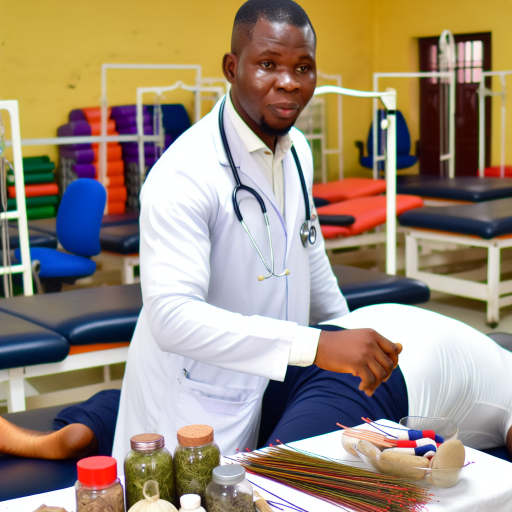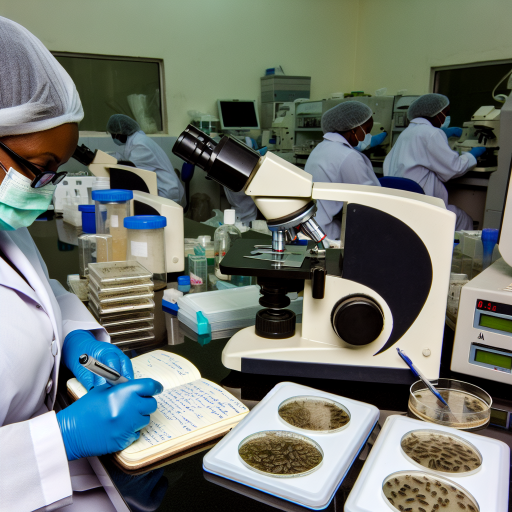Introduction:
Microbiology research in Nigeria is vital for scientific advancement and public health.
Securing funding is crucial to propel research initiatives and discoveries.
Researchers in Nigeria encounter obstacles like limited resources and equipment due to insufficient funding.
Government Funding
When it comes to funding for microbiology research in Nigeria, the government plays a crucial role in providing financial support for various research initiatives.
Here, we will delve into the funding provided by the Nigerian government for microbiology research.
We will highlight some initiatives or programs aimed at supporting research in the field.
Finally, we will evaluate the effectiveness of government funding in promoting research.
Funding Provided by the Nigerian Government
The Nigerian government recognizes the importance of scientific research, including microbiology.
It allocates a portion of its budget to support research activities in this field.
Various government agencies, such as the National Institutes of Health (NIH) and the Nigerian Institute for Medical Research (NIMR), provide funding for microbiology research projects.
These funds are used to cover expenses such as laboratory equipment, research materials, and personnel salaries.
Initiatives or Programs Aimed at Supporting Research
In addition to direct funding, the Nigerian government has implemented initiatives and programs that are specifically designed to support research in microbiology.
One such initiative is the Research and Innovation Fund (RIF), which provides grants to researchers working on innovative projects in various scientific disciplines, including microbiology.
Another program is the National Research Fund (NRF), which supports research projects that have the potential to make significant contributions to knowledge and scientific advancements in Nigeria.
Evaluation of the Effectiveness of Government Funding
While government funding for microbiology research in Nigeria is essential, there are certain challenges and limitations that need to be addressed to maximize its effectiveness.
One common issue is the bureaucratic nature of the funding application process.
This process can be time-consuming and cumbersome for researchers.
Additionally, there is a need for increased transparency and accountability in the allocation and disbursement of funds.
This will ensure that they are used efficiently and effectively.
Government funding plays a vital role in supporting microbiology research in Nigeria.
By providing financial resources and implementing initiatives and programs aimed at supporting research activities, the government helps to advance scientific knowledge.
It also contributes to the development of the country’s research infrastructure.
There is still room for improvement in terms of streamlining the funding process.
Enhancing accountability will further promote research in the field of microbiology.
Private Sector Support
When it comes to funding microbiology research in Nigeria, the private sector plays a significant role in providing financial support.
Exploring the Role of the Private Sector
The private sector in Nigeria has the potential to contribute to the funding of microbiology research through various means.
This can include direct financial support, in-kind contributions, or collaborations with research institutions.
Partnerships and Collaborations
Several partnerships and collaborations have been formed between research institutions and private companies in Nigeria to support microbiology research.
These partnerships often involve joint research projects, funding initiatives, or the sharing of resources and expertise.
Evaluating Impact
The impact of private sector support on the advancement of microbiology research in Nigeria cannot be overstated.
This support has helped to drive innovation, facilitate knowledge transfer, and promote the commercialization of research findings.
The involvement of the private sector in funding microbiology research in Nigeria is crucial for the continued growth and development of the field.
With their financial resources, industry expertise, and access to cutting-edge technologies, private companies can make a significant contribution to advancing scientific knowledge and addressing key challenges in microbiology research.
Uncover the Details: Challenges in Orthopaedic Tech in Nigeria
International Funding:
International organizations and foreign donors play a crucial role in supporting microbiology research in Nigeria.
They provide grants, scholarships, and funding opportunities for Nigerian researchers to carry out their research projects.
One example is the Global Fund for AIDS, Tuberculosis, and Malaria, which has supported research on infectious diseases in Nigeria.
Other organizations like the World Health Organization and the Bill & Melinda Gates Foundation also contribute to research funding in Nigeria.
Benefits of International Funding:
- International funding allows Nigerian researchers to access resources and expertise that may not be available locally.
- It enables researchers to collaborate with experts from around the world, leading to advancements in microbiology research.
- International funding also helps to raise the profile of microbiology research in Nigeria on a global scale.
Challenges of Relying on Foreign Funding:
- Dependency on foreign funding can create a risk of prioritizing research topics based on donor interests rather than local needs.
- There may be fluctuations in funding availability, leading to uncertainties in the continuity of research projects.
- Some international funding sources may come with stringent requirements and reporting procedures, which can be time-consuming and bureaucratic.
Explore Further: Understanding Restorative Dental Terminology
Challenges and Limitations:
Identifying the main challenges faced by researchers in securing funding for microbiology research:
- Limited funding opportunities from government agencies.
- Lack of private sector support for research projects.
- High competition for available research grants.
- Insufficient funding for equipment and laboratory resources.
- Bureaucratic processes in accessing research funds.
Implications of limited resources on the quality and quantity of research in Nigeria:
- Decreased innovation and breakthroughs in microbiology.
- Inability to attract top talent and researchers to the field.
- Low publication output and impact in the scientific community.
- Hindered progress in addressing public health issues.
- Stagnation in academic and industrial advancements.
Potential solutions to address the funding gaps in the field:
- Advocating for increased government funding for research.
- Encouraging collaboration with international funding agencies.
- Establishing research endowments and grants for microbiology.
- Promoting public-private partnerships for research funding.
- Creating incentives for companies to invest in research and development.
The challenges of funding for microbiology research in Nigeria are multifaceted.
Transform Your Career with Expert Guidance
Get personalized mentorship consulting that’s tailored to your unique path. Our expert advice is actionable and exclusive.
Get StartedWith innovative solutions and collective efforts, the field can overcome these limitations and thrive.
It is crucial for stakeholders to recognize the importance of investing in research for the advancement of microbiology in Nigeria.
See Related Content: Nutritional Guidelines for Nigerian Children

Success Stories:
-
Example 1:
One successful microbiology research project in Nigeria that received adequate funding is the study on the prevalence of antibiotic resistance in hospitals.
This project involved collecting samples from different hospitals across the country and analyzing them to determine the level of antibiotic resistance in various bacteria strains.
-
Example 2:
Another noteworthy project is the research on the impact of climate change on vector-borne diseases in Nigeria.
This study received substantial funding, allowing researchers to study the correlation between changing environmental conditions and the spread of diseases like malaria and dengue fever.
Impact on Microbiology and Public Health:
-
Impact 1:
These projects have significantly contributed to the field of microbiology by providing valuable insights into the mechanisms of antibiotic resistance and the relationship between climate change and disease spread.
The findings have been published in reputable journals, further enhancing Nigeria’s reputation in the global scientific community.
-
Impact 2:
Moreover, the research outcomes have had a direct impact on public health in Nigeria.
For instance, the study on antibiotic resistance has influenced hospital policies on antibiotic use, leading to better management of infections and reduced rates of drug-resistant bacteria.
Likewise, the research on vector-borne diseases has informed public health interventions to control the spread of these diseases, ultimately improving health outcomes for the population.
Lessons Learned:
-
Lesson 1:
One key lesson from these success stories is the importance of adequate funding in driving impactful research initiatives.
By providing researchers with the necessary resources, funding agencies can facilitate groundbreaking studies that address critical gaps in knowledge and contribute to scientific advancements.
-
Lesson 2:
Additionally, these projects underscore the significance of interdisciplinary collaboration in addressing complex scientific challenges.
The successful research endeavors involved collaboration between microbiologists, epidemiologists, climatologists, and public health experts, highlighting the value of diverse expertise in tackling multifaceted issues.
Uncover the Details: The Role of Veterinary Medicine in Nigerian Agriculture
Importance of Sustainable Funding in Microbiology Research
After discussing funding challenges in microbiology research in Nigeria, it is evident that sustainable financial support is crucial for advancement in this field.
The importance of investing in research cannot be overstated, as it drives innovation, addresses public health concerns, and contributes to economic growth.
Collaboration among government agencies, private organizations, and international partners is necessary to improve funding opportunities.
By working together, stakeholders can leverage resources, share knowledge, and create a conducive environment for researchers to thrive.
Ultimately, sustained funding for microbiology research is vital for Nigeria to harness its potential in combating infectious diseases, developing biotechnological solutions, and expanding scientific knowledge.
It is imperative that all involved parties prioritize funding allocation to ensure the progress and success of microbiology research in the country.
Additional Resources
Dr. Stella Ifeanyi Smith | Emory School of Medicine
The Nigerian Institute Of Medical Research – Research For National …




